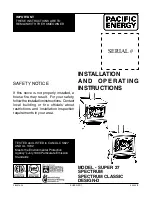
P43 Pellet Stove
removing ashes:
When approximately 1 ton of pellets has been
burned, it will be necessary to empty the ash pan.
ashes should be placed in a metal container
with a tight fitting lid. The closed container of
ashes should be placed on a noncombustible
floor or on the ground, well away from all com
-
bustible materials, pending final disposal. If
ashes are disposed of by burial in soil or other-
wise locally dispersed, they should be retained
in the closed container until all cinders have
thoroughly cooled.
1. Pull on latch handle and remove ash pan. Use ash
pan handle to carry and dispose of ashes.
. Slide the ash pan back into the stove and latch the
door by pushing down on the latch handle.
cleaning:
The stove should be cleaned after burning ap-
proximately 1 ton of pellets (50 bags). The cleaner
the stove the more efficient it will be. You will burn
less pellets and heat output will be greater.
note:
Higher ash content pellets will require
more frequent cleanings.
1. Shut down stove and
disconnect power cord
to
insure that all motors are stopped.
. Clean heat exchanger with scraper as shown in
fig 27.
3. Brush or scrape the inside of the stove to remove
fly ash.
4. Scrape burnpot with flat end of scraper provided
with the stove. Inspect the holes on the burnpot
surface. See Fig. 33.
5. Open burn pot clean-out. Clean fly ash from burn
pot and replace cover.
6. Remove ash pan.
7. Remove combustion blower cover by turning the
blower cover latch vertical, see Fig.6. Sliding the
cover out of the slot on the left.This will expose
the combustion blower wheel and flue outlet,
Fig.7.
Scraper
Blower Cover
Latch
Blower
Wheel
Flue
Outlet
Heat Exchanger Fins
Fig 27
Maintenance
Combustion
Blower Cover
Blower Cover
Latch
Fig 26
cleaning the door glass
•
Always use a soft cloth and glass cleaner (such as Windex, or a mixture of vinegar & water) to clean the glass.
•
Do not use razor blades or any other hard object to scrape the glass.











































